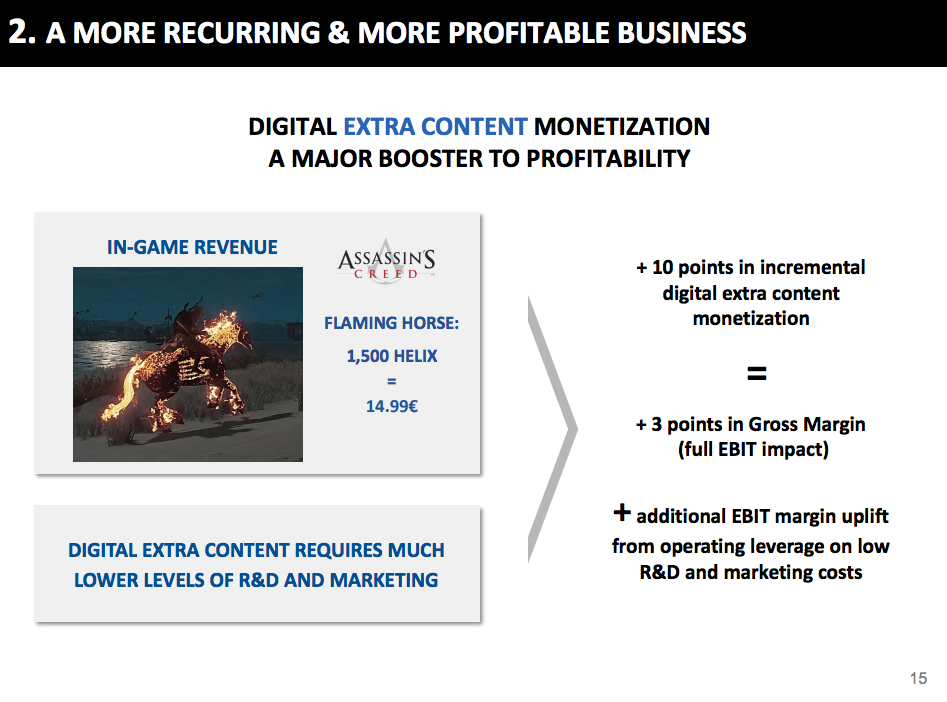Ubisoft Makes A Lot Of Money From Microtransactions, And It Wants More
Revenue from microtransactions is growing at Ubisoft.
Microtransactions are big business at Ubisoft. The publisher today reported earnings for the latest period, and one slide from the company's presentation mentioned that add-on content was a "major booster to profitability" during the quarter.
Specifically, Ubisoft made €318.5 million from what it calls Player Recurring Investment during the last nine months. This figure is up 87.4 percent from the same period last year. Revenue from PRI made up 26.7 percent of total sales during the period, which is up from 20.9 percent compared to the same period last year.

This content is high-margin, Ubisoft said, given that it requires lower levels of marketing and research & development expenses. As an example, Ubisoft pointed out that it sells a flaming horse in Assassin's Creed: Origins for 1,500 worth of in-game currency, which comes out to €15.
Player Recurring Investment at Ubisoft includes things like in-game items and DLC packs, along with revenue from subscriptions and advertising. Another slide shows how Ubisoft revenue from PRI compares to similar figures from companies like EA and Activision Blizzard. As you can see in the image below, Ubisoft is trailing those companies on a percentage basis, though Ubisoft is intent on "clos[ing] the gap" with them as it relates to microtransaction revenue. This is to say, you can likely expect microtransaction systems in Ubisoft games to continue and expand in the future.

Ubisoft went on to say that the progress the company has made in the area of "player investment" should pay dividends when it comes to microtransaction revenue. For Rainbow Six Siege, the game reached a new monthly active user record in December, which is impressive considering the game launched two years ago in December 2015. Given that players are sticking around with Ubisoft games for a long time, that gives Ubisoft the opportunity to continue to sell them new content for a long time. The Division is also going strong, with The Division 2 now on the way.
Also during the presentation, Ubisoft CFO Alain Martinez was asked for his reaction to the controversy and discussion around loot boxes in gaming today. He said Ubisoft thinks about loot boxes as "a question of quality and choice; it's as simple as that."
For the transaction to feel fair, the content that Ubisoft offers has to be the "right quality." He added that the items for sale should not feel necessary, but only optional. Players should feel free to not buy the content and still have a good time with any game.
Finally, Martinez acknowledged the discussion and debate happening right now across the world in regards to whether or not loot boxes should be considered gambling. Martinez said this controversy might be overblown, adding that the discussion he is seeing now is "much calmer" than before. He added that Ubisoft does not feel there is any major regulatory issue regarding loot boxes.
Ubisoft is not the only company making a lot of money from microtransactions. Activision Blizzard announced last week that it made $4 billion from microtransactions in 2017, while Take-Two's microtransactions business is booming too, thanks in part to GTA Online. EA, meanwhile, made $787 million from microtransactions during its latest quarter.
Got a news tip or want to contact us directly? Email news@gamespot.com
Join the conversation